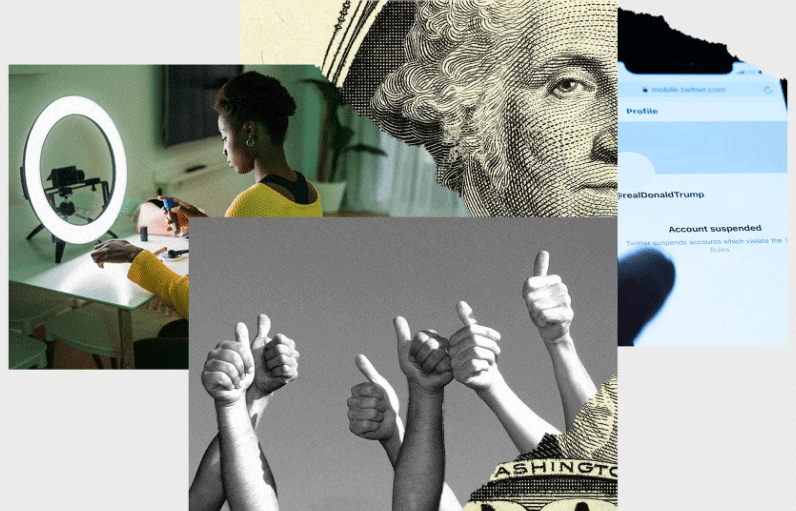
IN FEBRUARY, SHIT hit the fan in the usual way: An old tweet resurfaced. Brantly Millegan, director of operations at Ethereum Name Service (ENS), a web3 business, had written the following in May 2016: “Homosexual acts are evil. Transgenderism doesn’t exist. Abortion is murder. Contraception is a perversion. So is masturbation and porn.” After Millegan confirmed that these were still his beliefs, debate in the crypto and ENS community exploded. One side argued that Millegan’s personal beliefs had nothing to do with his role at ENS, and besides, cancel culture is a web2 thing, not a web3 thing. The other side took the “Well why should we support and work with an asshole” stance.
This kind of situation is exhaustingly familiar on a platform like Twitter, where the power to moderate online communities has ballooned into a matter of constitutional importance. But being a mod didn’t use to be this hard. In the heady days of the early internet, I’m told, the specificity and size of social platforms made it easy to know which content didn’t belong, and the more intimate relationships made judging intent a not-impossible task. Kicking someone out of the chat also held less serious repercussions than, say, deciding whether to deplatform the president of the United States. The question of whether a social media site like Twitter has the right to silence bad actors didn’t end with the new administration, and web3 technologies seem to offer a tantalizing alternative.

The debate over Millegan could have raged on for days with no results—except the ENS community had power to deal with the issue directly. Those who had bought ENS, a kind of Ethereum-based domain name, were given $ENS, so-called governance tokens that allow holders to vote in the ENS DAO (decentralized autonomous organization) that manages the company. In theory, governance tokens are used to decentralize power in web3 enterprises; in practice, however, holders will often delegate their votes. Most $ENS holders had delegated a large share of their voting power to Millegan.
But after his views became clear, $ENS holders quickly organized to start un-delegating their votes from Millegan. By the end of the night, Millegan went from carrying a majority vote to having less than 1 percent of voting power. “We are, on a few hours notice and without centralized permission, without board meetings, globally, without censorship, on a neutral computational substrate, autonomously, un-delegating our gov. votes to this guy,” wrote @dystopiabreaker, one of the main organizers, on Twitter. “Remind me again how would you do that at your C-Corp?”
AT FIRST GLANCE, governance tokens are a thrilling, utopian idea, because right now the internet sucks. Shall I list the ways? Cheap and divisive content, algorithms that categorize users into types of consumers while obfuscating the creators and the people they want to see and engage with, data harvesting, et cetera, et cetera. Even having a crumb of control would feel so good in the current paradigm. The problem is, a crumb might be all you get, if that.
The issue with governance tokens, like so many other things, comes down to distribution. While the ENS situation may look like a case of direct democracy, with one person equaling one vote, that’s almost never the case.
I first learned about governance tokens last November when reporting on NFT.NYC, a crypto-conference turned spring break for everyone with an expensive Twitter avatar. There, I met Jonathan Perkins and John Crain, cofounders of the very successful NFT platform SuperRare. Like so many other NFT platforms, they were overwhelmed by the demand, and the pressure was made worse because SuperRare is a curated platform: You have to apply to sell on their site. But instead of becoming the gatekeepers of taste, they instead had the idea to use governance tokens.
SuperRare had begun to drop governance tokens called $RARE which holders could use to vote on which mini-galleries—called Spaces—could sell on the SuperRare platform. These Spaces would be run independently, with their own themes and curatorial standards. Sharing this kind of decisionmaking power with users seemed thrilling, until I asked how these tokens were being distributed.
SuperRare distributed the first 15 percent of $RARE tokens to core creators and collectors who had been early adopters of the platform and active since. As for the bulk of the remaining tokens, it was clear that voting power was being used as a reward for investment in the company, by being a collector, an investor, a SuperRare team member, or a strategic partner. The reward is commensurate with your investment; there is no one-person, one-vote system in place. So when it came time to vote on which mini-galleries would be allowed to set up shop, the results weren’t surprising.
Four of the five winning Spaces shared the same traits: a large, preexisting collection, majority white team members, and experience putting together major exhibitions and sales, at times with institutional art world collaborators. Colborn Bell listed on his application for the Museum of Crypto Art (MoCA) Space that he is “one of the earliest and largest collectors on SuperRare, having purchased 700+ pieces.” 33 Space, led by the anonymous collector 33NFT, has over 1,000 NFTs in their personal collection. Their team included those with previous work experience for luxury brands like Dolce & Gabbana and entertainment companies like Disney, as well as major finance and tech enterprises.
So who gets a vote? People who felt financially secure enough to invest in a risky, novel, and speculative market. And when given further voting power, they immediately selected teams made up of people just like them: those capable of becoming early adopters or who jumped in even when things got expensive because they had the means. In no way does what occurred with the Space Races, this decentralized experiment, resemble any truly revolutionary artistic movement. In fact, it's looking a lot like the art world we already have and which this new guard is supposedly positioned against (though I haven’t heard of an NFT marketplace that hasn’t happily collaborated with auction houses like Christie’s or Sotheby’s).
OF COURSE, SUPERRARE is a business, and the privilege of governance naturally flows to those who create value, by being either creators or investors. But there are powerful forces at work trying to integrate this technology in such a way that it becomes much more mainstream.
Twitter founder Jack Dorsey recently posted about his intentions to bring forth web3 social media. In Mark Zuckerberg’s metaverse announcement, he hinted at the integration of web3 technologies like NFTs so we can buy into our new, even more online lives. It is a guarantee that web3 tech will be used to squeeze as much money from users as possible, as web2 did before it, and the reward for buying content or any other profit-increasing activity will be governance.
While the allure of community moderation is the utopian ideal of governance tokens, it seems unlikely that tokens in a web3 social media platform would be used to vote people out of their privileges of speech. If future platforms do make the terrible decision to use governance tokens as a method of sharing moderating power, however, the legal nightmare of being responsible for hate speech, incitement to riot, the rest of it, would be impossible. The consequences would be chaotic, and such a platform might be seriously unsustainable, but given recent history the option could be highly enticing.
Instead, we might see them used to moderate and manage creator economies, where top creators and consumers wield the power to infuse certain projects or grants with cash, or governance tokens are required to do certain things, such as sharing other people’s posts. Governance might also mean the power to promote certain projects. The possibilities are endless, as long as you’re a part of these specific minorities who actually get to vote.
If a user has to pay to be part of web3, and if web3 is the future of the internet, it’s easy to see a future where the average consumer is completely blocked from participating. It seems like we’re in line to experience an internet where having more money very directly translates to having the power in one’s online community. An explicitly classed internet. Kind of sounds like hell.
There are contexts in which web3 tech is not only appropriate, it is preferable. If the ENS/Milligen case shows anything, it’s that web3 can pave the way for communally owned businesses to give a wide swath of stakeholders a vote without the belittling labyrinth of bureaucracy. A world where more businesses decentralize power is a great one if this model could benefit more than just early adopters.
The trouble is that this won’t work out the same way for social media. There is a huge difference between a clear-cut web3 business and social media platforms, which are more than just businesses—they’re vitally important public forums. The practice of massaging all online social interactions into its most profitable expression is never going to turn out well, whether it’s a web2 or web3 model. We all deserve to have a say in how our online communities are run, but expecting major companies to give us that voice is naive.
There is so much nostalgia for the early internet because communities were small enough to recognize everyone else’s investment: investment that came in the form of writing stupid long fanfiction, organizing zines, commenting, beta-ing, holding your virtual friend’s virtual hand through their IRL problems. This simply doesn’t scale up. A company with billions of users can’t see this kind of commitment, much less reward it. Sure, web3 has the potential to make our lives more democratic, but it’s not a silver bullet. Scale is an insurmountable problem, so is capitalistic greed. If we fall too quickly for these promises, we’ll end up looking back fondly at the days of data harvesting as we navigate a segregated internet.
From:https://www.wired.com/story/web3-governance-tokens-cryptocurrency-content-moderation/
 Web3News
Web3News




